Art | 03.01.2012
Cologne exhibition examines role of the body in post-war sculpture
"Vor dem Gesetz steht ein Türhüter" (A gatekeeper stands before the law) is the world-famous first sentence of Franz Kafka's short story about a country doctor that comes to the city and requests entry into the law. In vain, the visitor waits for years to be let in. Just before his death, he asks the gatekeeper why he is the only one to have requested entry in so long. The answer: The gate was made just for him.
The man from the countryside learns that any given law is open to interpretation.
Artists, in particular, can attest to that fact, having often seen their right to expression trampled by hostile social movements and governments. In the wake of the Second World War, creative spirits in Germany took up questions like what it means to live in a world that has no respect for human life. The exhibition "Before the Law" in Cologne's Museum Ludwig examines how neglect for human rights shaped art from the post-war period through the present. The focus is on sculpture.
Diagnosis of the present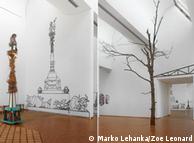 Untitled by Marko Lehanka, 1999 / Zoe Leonard, "Tree," 2011Painting can only illustrate suffering and can easily become kitschy, said exhibition curator Kasper König, one of Germany's most celebrated art experts. In 1977, he established the Sculpture Projects Münster, which has since taken place ever 10 years. Since 2000, König has been director of Museum Ludwig, a major exhibition hall for modern and contemporary art.
Untitled by Marko Lehanka, 1999 / Zoe Leonard, "Tree," 2011Painting can only illustrate suffering and can easily become kitschy, said exhibition curator Kasper König, one of Germany's most celebrated art experts. In 1977, he established the Sculpture Projects Münster, which has since taken place ever 10 years. Since 2000, König has been director of Museum Ludwig, a major exhibition hall for modern and contemporary art.
Before he completes his time in office at the end of this year, he's offering one more major show in Cologne that examines some of the fundamental elements of human life. For König, the show is both about reflecting on existential questions and offering a diagnosis of the present.
Broken bodies
Wilhelm Lehmbruck's "Sitting Youth" from 1916-1917 is among the earliest pieces in the exhibition. The figure sits with her limbs turned inward and her head hanging in sadness. The sculpture was first shown in the year 1955 at the inaugural edition of the famous documenta art show in Kassel, Germany.
Gerhard Marcks' "Chained Prometheus" from 1948 is another sculpture with suffering at its core. The figure's narrow, fragile features suggest a likeness with expressionist sculptor Wilhelm Lehmbruck. The bowed head and chained hands reflect the artist's own persecution during the Nazi era.
The fragility of the human body is a central theme in early post-war art, evident also in a mutilated figure sculpted by Henry Moore, in a powerless Madonna sculpture by Fritz Cremer, and in Alberto Giacometti's "La Jambe," which consists of a leg fragment resembling a prosthesis joined to a base. Each piece exudes a sense of helplessness. The post-war works on display are proof of art's capacity to make pain perceptible.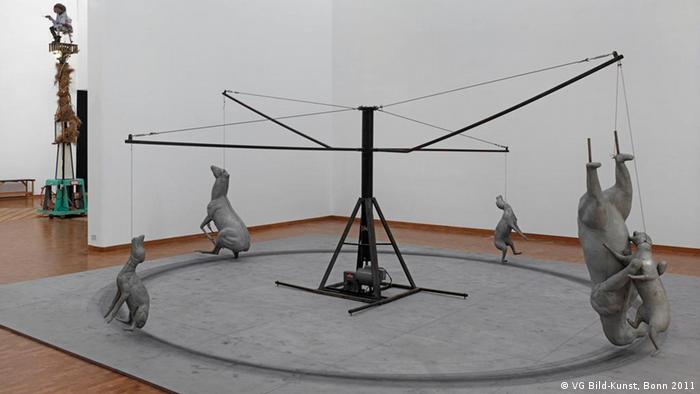 Bruce Nauman, "Carousel," 1988
Bruce Nauman, "Carousel," 1988
One question remains
Contemporary art doesn't restrict itself to a single point in the room or to a single base. Rather, the works often draw in entire rooms. Bruce Nauman's "Carousel" offers a good example. The lifeless remains of animals' bodies hang suspended from poles that turn on their own. Each corpse is covered with a dead grey material.
In the entryway to the exhibition, guests see American artist Jimmy Durham's "Building a Nation." Its theme is the appropriation of North America by European settlers, and the piece recalls an abandoned building. Pieces of a door and furniture allow the viewer to imagine an edifice. Racist statements hang on the few walls of the structure, many of which represent arrogant demands like, "Indians out!"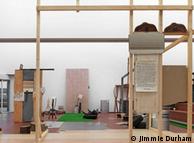 Jimmie Durham, "Building a nation," 2006Jimmy Durham is of Native American heritage and offers a personal take on the colonial slaughter of his ancestors.
Jimmie Durham, "Building a nation," 2006Jimmy Durham is of Native American heritage and offers a personal take on the colonial slaughter of his ancestors.
The exhibition brings historical sculptures into dialogue with contemporary installations. But violations of human rights make up the thread that unifies the diverse works on display.
At least one question lingers after taking in the exhibition: Where are we today as people, artists and society?
Author: Sabine Oelze / gsw
Editor: Kate Bowen
Culture | 02.01.2012
The arts in 2012: James Bond and Occupy
Frederick the Great, known as "Old Fritz," believed each person should be happy in his own way. He is known for his passion for politics and military drills, but also for playing the flute. In 2012, the former King of Prussia would have turned 300.
This year also marks one century since the death of German writer Karl May, best known for his "Winnetou" books. Fans will commemorate him by visiting the Karl May Museum near Dresden. With more than 100 million books sold, he is the most widely read German language author.
Contemporary art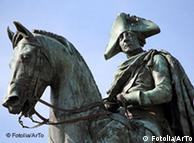 Prussian history is in the foreground this yearDocumenta in Kassel will be opening its doors once again. The exhibition, which takes place every five years, is considered the most significant event for contemporary art, objects, installations and performances from artists around the world.
Prussian history is in the foreground this yearDocumenta in Kassel will be opening its doors once again. The exhibition, which takes place every five years, is considered the most significant event for contemporary art, objects, installations and performances from artists around the world.
"Collapse and Reconstruction" is the theme of documenta 13, while the event maintains its tradition of keeping its list of artists under wraps ahead of time. Only three of the 100 participating artists are known: Italian Guiseppe Penone, American sculptor and city planner Theaster Gates, and Johannesburg-based artistWilliam Kentridge.
A growing interest in modern art is driving the prices up. Renowned German artist Gerhard Richter said the sums his paintings go for are "as absurd as the banking crisis." Its not uncommon for his works to sell for eight-digit sums.
Such amounts have more to do with speculation than with the value of a canvas, added the artist, who will celebrate this 80th birthday in February.
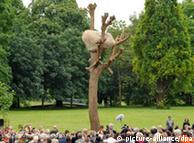 'Idee di Pietra' Giuseppe Penone was the first work from documenta 13 to be revealed"The works are no longer exhibited, but put in storage as a safe investment, like a Rolex or a Porsche," said Markus Eisenbeis, owner of Cologne-based auction house Van Ham.
'Idee di Pietra' Giuseppe Penone was the first work from documenta 13 to be revealed"The works are no longer exhibited, but put in storage as a safe investment, like a Rolex or a Porsche," said Markus Eisenbeis, owner of Cologne-based auction house Van Ham.
Silver screen
The Berlin International Film Festival will kick off a series of cinematic events in 2012. After that, "The Hobbit," a film by Oscar-winner Peter Jackson, should draw a lot of attention. The movie is expected to be similar to his trilogy, "The Lord of the Rings," and include spectacular special effects.
George Clooney leads the cast in "The Descendants," while Hollywood newcomer Andrew Garfield stars in a sequel to "Spiderman," and Daniel Craig returns as 007 in the latest James Bond movie, "Skyfall."
German cinema also has its share of interesting movies on deck. Director Helmut Dietl is filming "Zettl," a sequel to the successful television series, "Kir Royal," with actor Michael Herbig.
One of Germany's best-known younger actors, Matthias Schweighofer, is the main character in a film adaptation of Vladimir Kaminer's novel, "Russian Disco." He plays a Russian who moves to Berlin to begin a new life shortly after the fall of the Wall in 1989.
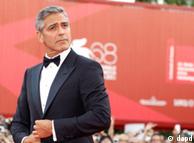 George Clooney stars in 'The Descendants'
George Clooney stars in 'The Descendants'
Relevant stories
The literary world is seeing a return to the banal this year, University of Duisburg literature expert Andreas Erb told Deutsche Welle. The more complex life becomes, the more people want to read books they can grasp.
Stories this year will focus on issues like the debt crisis, the Occupy movement and the protests against storage and transport or radioactive material.
"There is a tendency to capture the moment," said Tanja Postpischil from Suhrkamp publishing house. She expects books from celebrities and politicians to remain bestsellers.
One highly anticipated book will be related to Germany's "trial of the year" in 2011. Former weatherman Jörg Kachelmann, who was acquitted on charges of raping his girlfriend, is set to release the novel "Mannheim," which recounts his experiences in prison.
German Family Minister Kristina Schroeder is expected to tackle the ongoing issue of quotas for women in boardrooms in a book entitled, "Danke, emanzipiert sind wir selber" (Thank you; we are emancipated on our own).
But literature won't be limited to current affairs. Biographies on Frederick the Great should be a hit, as well as new editions of works by Charles Dickens, who would be turning 200 in 2012.
The Leipzig Book Fair in March will present a new section on education. Others are eyeing the Frankfurt Book Fair in October, which will coincidentally feature another country with volcanoes after Iceland took center stage in 2011. New Zealand will step into the spotlight with the slogan, "While you were sleeping."
Clouds over Bayreuth
Tension on Bayreuth's Green Hill is nothing new - but trouble with the German Court of Auditors is. The festival has come under fire for its system of allocating tickets, with accusations that too many tickets are given to sponsors and celebrities.
The timing of the investigation is especially unpleasant because it comes just a year ahead of the 200th anniversary of composer Richard Wagner's birth. A revival of Wagner's "Ring" tetralogy is in the works, but has come up against a few hurdles. Well-known filmmaker Wim Wenders turned down the high-profile directing job, which was then given to Frank Castorf, the controversial director of the Berliner Volksbühne theater. Critics bemoan his complete lack of opera experience.
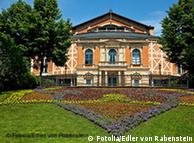 Bayreuth is no stranger to stressWhat's more, the Bayreuth Festival's main sponsor, Siemens, has pulled out, and it remains unclear whether the event will the open-air broadcasts will continue.
Bayreuth is no stranger to stressWhat's more, the Bayreuth Festival's main sponsor, Siemens, has pulled out, and it remains unclear whether the event will the open-air broadcasts will continue.
Nevertheless, a bit further south, things are looking up. The Salzburg Festival is expected to focus on religious music and become longer and more exclusive under the new director, Alexander Pereira.
On the other hand, the new director of the Ruhr Triennale, composer and theatre director Heiner Goebbels, promises to make the international festival for music, theater, literature, and dance, more unconventional and innovative. Productions will take place in unusual locations, like former machine halls and coking plants.
Author: Gudrun Stegen / cc
Editor: Kate Bowen
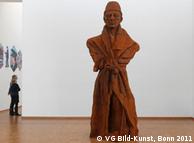
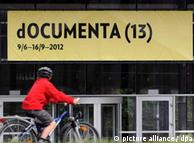
沒有留言:
張貼留言